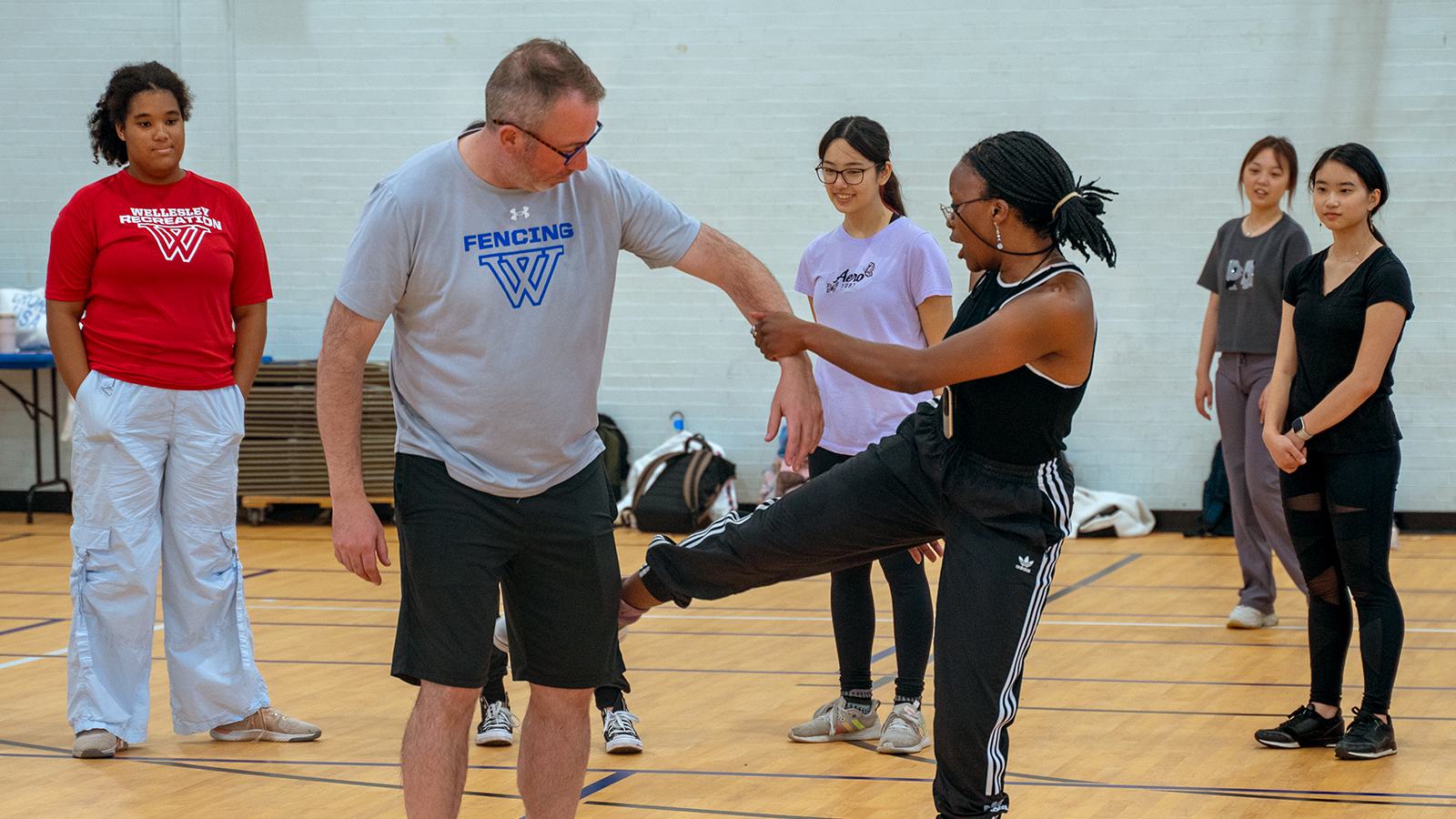“Shakespeare is for everyone. It’s not just for Shakespeare nerds and theater experts,” said Hayden Wood. Wood is a member of Actors From The London Stage, a theater company that hoped to convey this idea to Wellesley students during their late September visit to campus, part of their semiannual national tour of colleges, high schools, and a men’s correctional facility. The five actors conducted workshops, visited classes, and put on three performances of Shakespeare’s Twelfth Night that were free and open to the public.
Their weeklong residency included a visit to Wellesley’s Shakespeare Society, founded over 140 years ago. Shakes, as it is known on campus, is Wellesley’s oldest continuous society. Its headquarters is a Tudor-style replica of Shakespeare’s birthplace that includes a dedicated performance space. “Not only have I never seen a place quite like that on this tour, I’ve never seen a place like that anywhere,” said Wood. “It’s magical.”
The actors took a tour of the house, learned its history, and talked with society members, or Shakers. Ava Orcutt ’28 noted the particular benefits being at Wellesley provided her in these interactions. “The small community really makes it special,” she said. “At a school with 20,000 undergrads, I probably never would have ended up talking to any of the actors, because there’s just so many people to get to, and you don’t really have time for that personal connection.” She enjoyed bonding with the actors as fellow appreciators of the craft.
The actors commented on that connection as well. “It’s nice to come to a campus where people get what you’re doing and they’re enthusiastic about it,” said Sam Jenkins-Shaw. Actor Shona Babayemi agreed: “Everybody I’ve met has been so enthusiastic and wholeheartedly here and present and excited, and it just sort of reaffirms how brilliant this is.”

For Twelfth Night, performed in Alumnae Hall, the five actors used minimal costumes, sets, and props, relying on pure acting and a single visual signifier for each character, like a fan or a red clown nose. The small cast made unconventional choices, including Thuliswa Magwaza portraying a box tree with a sign hanging around her neck saying “box tree.” This approach made their individual performances stand out.
Scenes where two of a single actor’s characters were in conversation with each other provided an amusing back-and-forth. “It was really interesting to see their entire body language and even their tone of voice switch when they would go from one character to the other,” said Orcutt. “You could tell they really understood what they were saying, and in turn, the audience was able to understand what they’re saying,” which she noted isn’t always the case with Shakespeare’s works.
The show made the text more accessible in other ways as well. Inclusions like dancing and music—performed with a guitar, harmonica, and kazoos to accompany their voices—added a twist. In doing so, the actors hoped each audience member got something out of the performance, even if it wasn’t what they expected. “You want people to take away some one thing,” said Jenkins-Shaw. “It might be that they like the set, or the lack of set, or they like the music, or they like a certain speech or a certain relationship, but as long as it’s true for them, I think all reactions are welcome in our space.”
The actors also stopped by a variety of classes including romantic poetry, fencing, and an interdisciplinary course on public speaking and neuroscience to explore the ways performance intersects with other disciplines. “I have been both fencing and acting for a pretty long time, and it was interesting to think of these two things, that I generally thought of as being pretty separate parts of my life, in the same room,” said Rihanna Perry ’28, who was in the fencing class Magwaza led. “It allowed me to make a lot of connections between the two that I’ve never really made before.”
By extending the theater’s reach beyond the stage, the actors hope to convey literary and life lessons. One such lesson, Magwaza said, is “the answer is in the text always. … Stripping it down to what we have and the essence of what we’re doing in this structure and this context, you realize how much you don’t need anything else really. The text is everything.” They also hope students take away inspiration for their own creativity, no matter the form or situation. “You can create art in any circumstance,” said Babayemi. “Even if you took away our suitcase, our props, we’d still have this piece of work that tells us a true story and speaks to true human experience.”